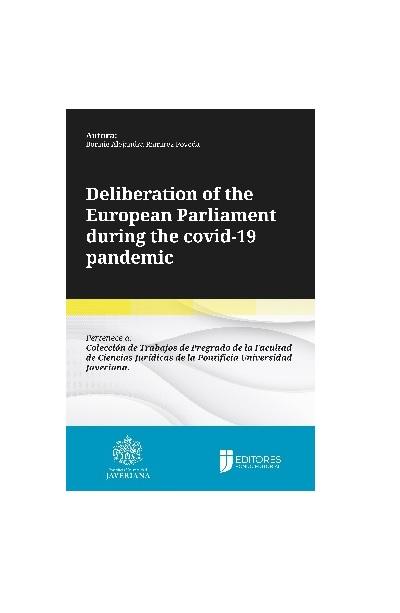Sin título DIRCOM-CONTENIDO-GENERICO - Ciencias Jurídicas
Deliberation of the European Parliament During the Covid-19 Pandemic / Bonnie Alejandra Ramírez Poveda

Autora: Bonnie Alejandra Ramírez Poveda
Directora: Maria Calara Jaramillo Jaramillo
Trabajo de pregrado en Derecho del Departamento de Filosofía e Historia del Derecho
ISBN (en proceso)
Ir a publicación:
Enlaces de difusión en redes sociales: Instagram; LinkedIn; Facebook; Twitter o X;
Abstract
The covid-19 pandemic imposed important challenges to decision-makers, and in many cases, accelerated paramount policy changes. The European Union, a crucial geopolitical actor, was impacted by the covid-19 in terms of health, trade and the overall economy. The study “Impacts of the COVID-19 pandemic on EU industries” conducted by the European Parliament stressed that compared to the global economy, the euro area has experienced a larger hit in 2020 and will experienced a slower recovery in 2021. Moreover, another study of the European Parliament shows that “the pandemic disrupted many supply chains at its outbreak, and the subsequent economic recovery, the strongest on record, led to enormous further strain on the global supply system; surging demand, coupled with shortages of workers, ships, containers, air cargo space and clogged ports, created a perfect storm. Supply chain bottlenecks are starting to weigh on the economic recovery, slowing growth and leading to delays, holding back the manufacturing sector and fueling inflation” . In a moment, where the Union was going through a transition to regain relevance both at international and domestic level by recognizing its strategic dependence on some foreign inputs and starting to seek ways to increase its independence as was manifested in the report “shaping and securing the EU´s open strategic autonomy by 2040 and beyond” of the European Commission. The European Commission pointed out, in its report, that the concept includes the ambition for the EU to assume greater responsibility for its own security, reduce one-sided dependencies in critical areas and strengthen its capacity to set and implement its own priorities. Furthermore, it explicitly referred to the influence of the pandemic in this regard, “ This concept has been brough to light by the Covid-19 pandemic, which has exposed vulnerabilities in Europe (e.g. disrupted medical supplies during the lockdown)” . In this context, the present research project intents to address, the challenges and developments brought by the sanitary crisis, under the scope of Deliberative Democracy theory, in the frame of the Union´s decision-making process, focusing on the role of the European Parliament by taking article 225 (TFEU).
Resumen
La pandemia del COVID-19 impuso retos importantes a los tomadores de decisiones, haciendo que en muchos casos, se aceleraran políticas públicas de gran magnitud. La Unión Europea, un importante actor geopolítico fue impactada especialmente fuerte por el COVID-19 en términos de saludo, comercio y economía. En ese contexto, el presente trabajo de investigación pretende abordar los retos y desarrollos que trajeron la crisis del COVID-19 a la luz de la teoría de Democracia Deliberativa y tomando como referencia el proceso de toma de decisiones de la UE, particularmente el rol del Parlamento Europeo y el artículo 225 del Tratado de Funcionamiento de la Unión Europea
